实务韩国语15届听力对本
词汇xiazaiwangzhi
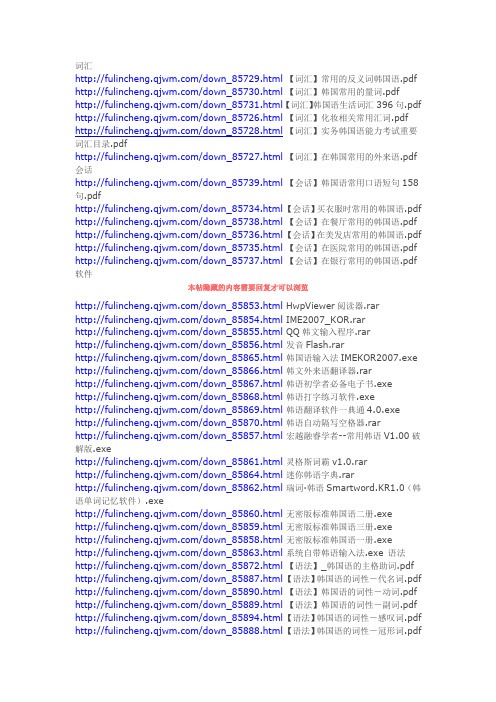
词汇/down_85729.html【词汇】常用的反义词韩国语.pdf /down_85730.html【词汇】韩国常用的量词.pdf /down_85731.html【词汇】韩国语生活词汇396句.pdf /down_85726.html【词汇】化妆相关常用汇词.pdf /down_85728.html【词汇】实务韩国语能力考试重要词汇目录.pdf/down_85727.html【词汇】在韩国常用的外来语.pdf 会话/down_85739.html【会话】韩国语常用口语短句158句.pdf/down_85734.html【会话】买衣服时常用的韩国语.pdf /down_85738.html【会话】在餐厅常用的韩国语.pdf /down_85736.html【会话】在美发店常用的韩国语.pdf /down_85735.html【会话】在医院常用的韩国语.pdf /down_85737.html【会话】在银行常用的韩国语.pdf 软件本帖隐藏的内容需要回复才可以浏览/down_85853.html HwpViewer阅读器.rar/down_85854.html IME2007_KOR.rar/down_85855.html QQ韩文输入程序.rar/down_85856.html发音Flash.rar/down_85865.html韩国语输入法IMEKOR2007.exe /down_85866.html韩文外来语翻译器.rar/down_85867.html韩语初学者必备电子书.exe /down_85868.html韩语打字练习软件.exe/down_85869.html韩语翻译软件一典通4.0.exe /down_85870.html韩语自动隔写空格器.rar/down_85857.html宏越融睿学者--常用韩语V1.00破解版.exe/down_85861.html灵格斯词霸v1.0.rar/down_85864.html迷你韩语字典.rar/down_85862.html瑞词·韩语Smartword.KR1.0(韩语单词记忆软件).exe/down_85860.html无密版标准韩国语二册.exe /down_85859.html无密版标准韩国语三册.exe /down_85858.html无密版标准韩国语一册.exe /down_85863.html系统自带韩语输入法.exe 语法/down_85872.html【语法】_韩国语的主格助词.pdf /down_85887.html【语法】韩国语的词性-代名词.pdf /down_85890.html【语法】韩国语的词性-动词.pdf /down_85889.html【语法】韩国语的词性-副词.pdf /down_85894.html【语法】韩国语的词性-感叹词.pdf /down_85888.html【语法】韩国语的词性-冠形词.pdf/down_85892.html【语法】韩国语的词性-名词.pdf /down_85895.html【语法】韩国语的词性-数词.pdf /down_85893.html【语法】韩国语的词性-形容词.pdf /down_85891.html【语法】韩国语的词性-助词.pdf /down_85886.html【语法】韩国语的否定表现.pdf /down_85884.html【语法】韩国语的句子成分.pdf /down_85885.html【语法】韩国语的句子构成.pdf /down_85896.html【语法】韩国语的音变现象.pdf /down_85883.html【语法】韩国语的元音和辅音.pdf /down_85873.html【语法】韩国语会话.pdf/down_85882.html【语法】韩国语将来时.pdf /down_85881.html【语法】韩国语句子的连接.pdf /down_85875.html【语法】韩国语句子的时制用法.pdf /down_85879.html【语法】韩国语句子的种类-感叹句.pdf/down_85876.html【语法】韩国语句子的种类-共动句.pdf/down_85878.html【语法】韩国语句子的种类-命令句.pdf/down_85877.html【语法】韩国语句子的种类-叙述句.pdf/down_85880.html【语法】韩国语句子的种类-疑问句.pdf/down_85874.html【语法】韩国语修辞法.pdf /down_85897.html【语法】韩国语音的长短、声调、连接.pdf/down_85898.html【语法】韩国语音韵变化和标准发音—_辅音同化.pdf/down_85899.html【语法】韩国语音韵变化和标准发音—紧音化.pdf topik考试/down_85901.html 18届TOPIK实务考试(B-TOPIK).zip/down_85903.html 18届TOPIK真题(初级).zip /down_85904.html 18届TOPIK真题(高级).zip /down_85902.html 18届TOPIK真题(中级).zip /down_85905.html 19届TOPIK实务考试(B-TOPIK).zip/down_85907.html 19届TOPIK真题(初级).zip /down_85908.html 19届TOPIK真题(高级).zip /down_85906.html 19届TOPIK真题(中级).zip /down_85911.html 2008年4月TOPIK真题(初级).rar/down_85912.html 2008年4月TOPIK真题(初级)标准答案.rar/down_85913.html 2008年4月TOPIK真题(高级).rar/down_85914.html 2008年4月TOPIK真题(高级)标准答案.rar/down_85909.html 2008年4月TOPIK真题(中级).rar/down_85910.html 2008年4月TOPIK真题(中级)标准答案.rar/down_85915.html 2010年2月17届TOPIK真题.zip /down_85916.html TOPIK必备单词2008版.rar /down_85917.html TOPIK必备单词(1-6级).rar /down_85918.html韩语等级考试必备单词Topik(1-6级).rar/down_85744.html【考试】韩国语能力考试(TOPIK)初级A_-_2010年_第19次初级A考试.zip/down_85745.html【考试】韩国语能力考试(TOPIK)初级B_-_2010年_第19次初级B考试.zip/down_85746.html【考试】韩国语能力考试(TOPIK)初级听力_-_2010年_第19次初级听力考试.zip/down_85751.html【考试】韩国语能力考试(TOPIK)高级A_-_2010年_第19次高级A考试.zip/down_85752.html【考试】韩国语能力考试(TOPIK)高级B_-_2010年_第19次高级B考试.zip/down_85753.html【考试】韩国语能力考试(TOPIK)高级听力_-_2010年_第19次高级听力考试.zip/down_85747.html【考试】韩国语能力考试(TOPIK)实务A_-_2010年_第19次实务A考试.zip/down_85748.html【考试】韩国语能力考试(TOPIK)实务B_-_2010年_第19次实务B考试.zip/down_85749.html【考试】韩国语能力考试(TOPIK)实务听力A_-_2010年_第19次实务A听力考试.zip/down_85750.html【考试】韩国语能力考试(TOPIK)实务听力B_-_2010年_第19次实务B听力考试.zip/down_85741.html【考试】韩国语能力考试(TOPIK)中级A_-_2010年_第19次中级A考试.zip/down_85742.html【考试】韩国语能力考试(TOPIK)中级B_-_2010年_第19次中级B考试.zip/down_85743.html【考试】韩国语能力考试(TOPIK)中级听力_-_2010年_第19次中级听力考试.zip 课件/down_85762.html《标准韩国语》第二册课后题答案.zip/down_85761.html《标准韩国语》第三册课后题答案.zip/down_85758.html《初级写作教程1》.rar/down_85759.html《初级写作教程2》.rar/down_85763.html《韩国的文化象征》.zip/down_85760.html《无师自通韩国语》教材下载(PDF1-19).pdf/down_85765.html【2008年版】第1~4课元音,辅音1.rar/down_85764.html【2008年版】第11~12课收音2.rar/down_85766.html【2008年版】第5~6课元音,辅音2.rar/down_85767.html【2008年版】第7~8课元音,辅音3.rar/down_85768.html【2008年版】第9~10课收音1.rar /down_85755.html 150个最常用的词.doc/down_85756.html bebeline.swf/down_85757.html typing_system.swf/down_85800.html标韩第二册课文翻译.doc/down_85799.html标韩第三册课文翻译.doc/down_85798.html标韩第一册课文翻译.docrar /down_85797.html标准韩国语1-3册mp3.rar /down_85789.html常用韩语语法格式总结表.rar /down_85787.html常用语.xls/down_85788.html常用语分析.xls/down_85793.html抽象概念惯用语.doc/down_85778.html初级中级韩语语法学习.rar/down_85777.html初学韩语经验.doc/down_85803.html第三册.doc/down_85783.html发音及其变音.doc/down_85792.html房地产韩国语.doc/down_85811.html跟韩亚娄老师在线学韩语发音.txt /down_85815.html韩国“国立国语院”统计的词频6000词.rar/down_85816.html韩国地名(中韩对照).rar/down_85817.html韩国汉字成语.doc/down_85818.html韩国语1语法汇总1.doc/down_85820.html韩国语变音规则.rar/down_85821.html韩国语的数词辅导讲义.rar/down_85819.html韩国语书写教材.rar/down_85836.html韩语打电话用语.doc/down_85832.html韩语单词.doc/down_85833.html韩语发音.swf/down_85834.html韩语发音的基本的规则.rar/down_85843.html韩语键盘.jpg/down_85840.html韩语讲义.pdf/down_85839.html韩语聊天必备.doc/down_85838.html韩语罗马拼音转换器.rar/down_85831.html韩语入门电子书.rar/down_85829.html韩语入门基础教程音频.swf /down_85830.html韩语入门学习建议音频.swf /down_85824.html韩语三百句MP3(10-16).rar /down_85825.html韩语三百句MP3(17-22).rar /down_85823.html韩语三百句MP3(1-9).rar/down_85826.html韩语三百句MP3(23-30).rar /down_85837.html韩语数字学习儿童flash.rar /down_85842.html韩语跆拳道术语.doc/down_85835.html韩语听写表.xls/down_85822.html韩语一级词汇必备.rar/down_85844.html韩语音节表升级版.rar/down_85841.html韩语语法大全WORD文档.rar /down_85828.html韩语元音和辅音.doc/down_85827.html韩语中的惯用句型及词组.rar /down_85780.html化妆品相关韩国语.doc/down_85784.html基本发音表.xls/down_85786.html家庭.doc/down_85810.html课表2.jpg/down_85802.html浪漫满屋剧本韩文对白.rar/down_85812.html连结词尾.doc/down_85813.html连音.doc/down_85805.html罗马音表.doc/down_85851.html马上说韩语电子书.doc/down_85801.html每课单词.doc/down_85806.html美国密西根大学使用的韩国语教材电子书(中.rar/down_85791.html情感.doc/down_85774.html人称代词用法总结.doc/down_85781.html十款实用的韩语字体.rar/down_85785.html实用简明韩语语法表下载版.rar /down_85794.html收音完整收费版.doc/down_85849.html首尔大学韩国语1-17课.wma /down_85850.html首尔大学韩国语18-30课.wma /down_85782.html双元音的拼成.doc/down_85773.html为女性结婚移民者准备的《中级韩语》.zip/down_85796.html无师自通韩国语随书mp3下载.zip /down_85795.html新速成韩国语.rar/down_85790.html形容词的动词化.doc/down_85769.html一课.rar/down_85775.html依存名词.doc/down_85814.html阴阳性元音.doc/down_85845.html音变.doc/down_85846.html音变讲义.doc/down_85847.html音标图.gif/down_85848.html音阶表.rar/down_85807.html语法总结标韩1.doc/down_85808.html语法总结标韩2.doc/down_85809.html语法总结标韩3.doc/down_85776.html元音加辅音.doc/down_85770.html中国传统礼仪调查表.doc/down_85771.html中韩交流标准韩国语第一册第一单元.rar/down_85772.html中韩语汉字对照表.doc/down_85804.html终结语尾.doc/down_85779.html助词.doc隐藏内容截图:================================================ ==============。
韩国语能力测试(TOPIK)-常见问题
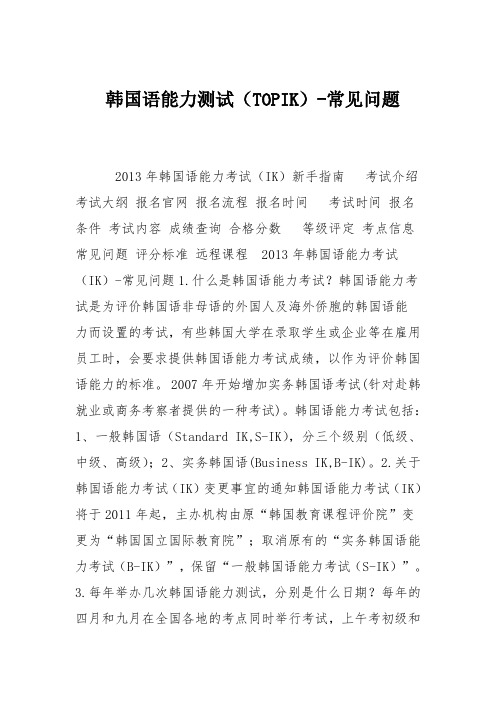
韩国语能力测试(TOPIK)-常见问题2013年韩国语能力考试(IK)新手指南考试介绍考试大纲报名官网报名流程报名时间考试时间报名条件考试内容成绩查询合格分数等级评定考点信息常见问题评分标准远程课程 2013年韩国语能力考试(IK)-常见问题1.什么是韩国语能力考试?韩国语能力考试是为评价韩国语非母语的外国人及海外侨胞的韩国语能力而设置的考试,有些韩国大学在录取学生或企业等在雇用员工时,会要求提供韩国语能力考试成绩,以作为评价韩国语能力的标准。
2007年开始增加实务韩国语考试(针对赴韩就业或商务考察者提供的一种考试)。
韩国语能力考试包括:1、一般韩国语(Standard IK,S-IK),分三个级别(低级、中级、高级);2、实务韩国语(Business IK,B-IK)。
2.关于韩国语能力考试(IK)变更事宜的通知韩国语能力考试(IK)将于2011年起,主办机构由原“韩国教育课程评价院”变更为“韩国国立国际教育院”;取消原有的“实务韩国语能力考试(B-IK)”,保留“一般韩国语能力考试(S-IK)”。
3.每年举办几次韩国语能力测试,分别是什么日期?每年的四月和九月在全国各地的考点同时举行考试,上午考初级和高级,下午考中级和实务韩国语(考生即可报名参加上午的考试,也可同时报名参加下午的考试)。
从2007年9月份开始的韩国语能力考试(IK)将实行网上报名。
4.报名前需要做哪些准备工作?网上报名要求电脑应与互联网连接并且装有网络浏览器(是IE浏览器)。
推荐显示分辨率为1024X768。
必须使用简体中文操作系统输入汉字。
注意:在汉字输入状态下,必须采取半角方式输入数字。
哪些注册信息是不可以更改的?姓名(包括中文姓名和拼音)、性别、证件类型和证件号码、出生日期。
5.如何报名参加考试?是否需要到考点报名?采取网上报名的方式。
考生可直接上网填写报名表,网上支付考费,考点不受理报名事宜。
报名网址是或6.今年的报名名额是否有限制?根据各考点的容量报名,报满为止。
2015高考电子版

2015年普通高等学校招生全国统一考试日语第一部分:听力(共两节,满分30分)第一节例:男のはどのぐらい日本語を勉強しましたか。
A:6か月B:9か月C:12か月1:男のは今どこに来ていますか。
A:デパートB:友だちの家C:先生に研究室2:この本はおもしろかったですか。
A:とてもおもしろかったですB:読んでいないので、よくわかりません。
C:読んだことがあるようですが、よく覚えていません。
3:女の人は昨日何をしましたか。
A: 家でゆっくりやすみました。
B: お姉さんと買い物に行きました。
C:家で雑誌を読んで過ごしました。
4:男の人はどこへ行こうと考えていません。
A:ハワイB:ヨーロッパCフランスとイギリス5:男の人は展覧会に行きますか。
A:行きます。
B:行きません。
C:分かりません。
6:図書館では、してもいいことはどれですか。
A:食べ物を食べること。
B:ジュースを飲むこと。
C:携帯電話を使うこと。
7:結婚式のお祝いはどのぐらいですか。
A:1万円ぐらいB:3万円ぐらいC:1万円から3万円ぐらい第二节8:女の人は何を忘れていましたか。
A:男の人の約束B:電話に出ることC:男の人に電話すること9.女の人はなぜ疲れていますかA.携帯を家に忘れたからB.試験の準備をしているからC.男の人のことを気にしているから10.2日目の予定はどうなっていましかA.食事をしますB.海へ行って、泳ぎますC.大学のプールで泳ぎます11.明日の予定はどうなっていましかA.寝坊→映画→食事B.寝坊→食事→映画C.食事→映画→寝坊12.出発と帰りの時間はどれですかA.出発8:00/帰り9:00B.出発19:00/帰り10:00C.出発11:00/帰り19:0013.いくらぐらいの旅館にする予定ですかA.6千円B.8千円C.1万円14.落とした財布はどうなりましたかA.自分で見つけましたB.交番で見つかりましたC.クラスメートが見つけてくれました15.分からないことは、ふだん誰に聞くのですかA.先生B.先輩C.クラスメート第二部分:日语知识运用(共40小题:每小题1分,满分40分)16.私は昆明で子供時代___過ごしていました。
第八届全国高校出版社优秀畅销书一等奖(225种)
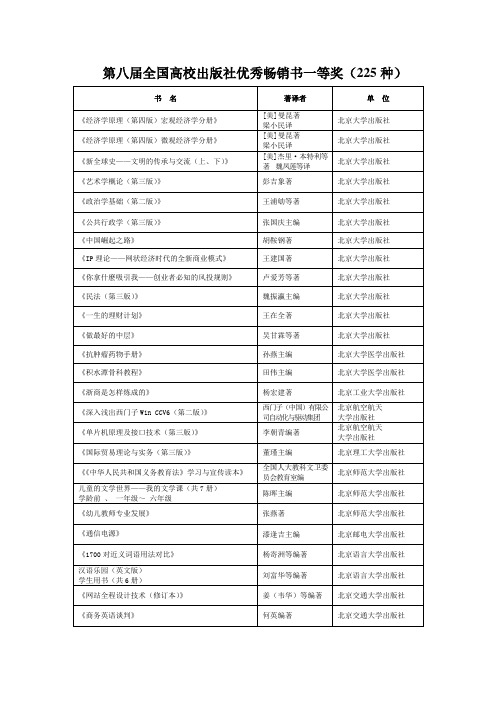
《新编基础会计(第四版)》
曲洪山等主编
大连理工大学出版社
《世纪商务英语函电与单证(第二版)》
刘杰英主编
大连理工大学出版社
《新版商务谈判日语》
刁鹂鹏编著
大连理工大学出版社
《成本会计习题与解答(第二版)》
鲁亮升主编
东北财经大学出版社
《经济法概论》
华本良主编
东北财经大学出版社
《新天地高职高专英语规划教材》(12册)听说教程1-4读写教程1-4综合教程1-4
《政治经济学(第三版)》
程恩富等主编
高等教育出版社
《知荣明耻从我做起(小学生读本)》
赵国柱等主编
人民教育出版社
《会计学基础》
韩辉主编
人民教育出版社.
《会计学基础实验教程》
张凯等编著
人民教育出版社
《教育新理念(修订版)》
袁振国主编
教育科学出版社
《为思维而教(修订版)》
郅庭瑾著
教育科学出版社
《教学论》
裴娣娜主编
杨怀定著
南京大学出版社
《高等数学(基础)》
冯宁主编
南京大学出版社
《管理学原理》
周三多等编著
南京大学出版社
《中小学班主任培训教材——小学班主任》
高谦民等主编
南京师范大学出版社
《供电企业典型诉讼案例评析》
周建海主编
河海大学出版社
《测量学(第四版)》
高井祥主编
中国矿业大学出版社
《煤矿重大安全生产隐患认定办法图解》
彭吉象著
北京大学出版社
《政治学基础(第二版)》
王浦劬等著
北京大学出版社
《公共行政学(第三版)》
TPO15听力解析
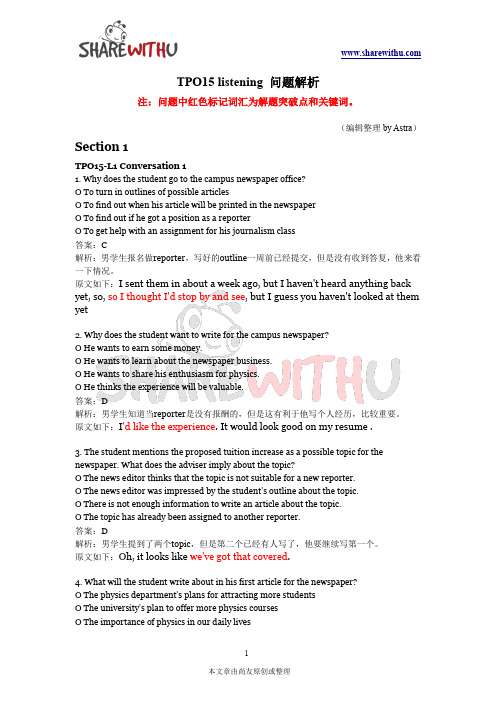
TPO15 listening 问题解析注:问题中红色标记词汇为解题突破点和关键词。
(编辑整理by Astra)Section 1TPO15-L1 Conversation 11. Why does the student go to the campus newspaper office?O To turn in outlines of possible articlesO To find out when his article will be printed in the newspaperO To find out if he got a position as a reporterO To get help with an assignment for his journalism class答案:C解析:男学生报名做reporter,写好的outline一周前已经提交,但是没有收到答复,他来看一下情况。
原文如下:I sent them in about a week ago, but I haven't heard anything back yet, so, so I thought I'd stop by and see, but I guess you haven't looked at them yet2. Why does the student want to write for the campus newspaper?O He wants to earn some money.O He wants to learn about the newspaper business.O He wants to share his enthusiasm for physics.O He thinks the experience will be valuable.答案:D解析:男学生知道当reporter是没有报酬的,但是这有利于他写个人经历,比较重要。
托福TPO15听力Conversation2文本+题目+答案解析
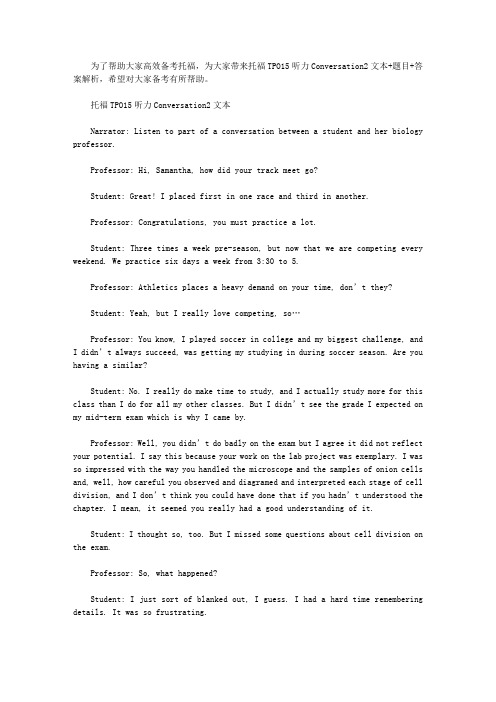
为了帮助大家高效备考托福,为大家带来托福TPO15听力Conversation2文本+题目+答案解析,希望对大家备考有所帮助。
托福TPO15听力Conversation2文本 Narrator: Listen to part of a conversation between a student and her biology professor. Professor: Hi, Samantha, how did your track meet go? Student: Great! I placed first in one race and third in another. Professor: Congratulations, you must practice a lot. Student: Three times a week pre-season, but now that we are competing every weekend. We practice six days a week from 3:30 to 5. Professor: Athletics places a heavy demand on your time, don’t they? Student: Yeah, but I really love competing, so… Professor: You know, I played soccer in college and my biggest challenge, and I didn’t always succeed, was getting my studying in during soccer season. Are you having a similar? Student: No. I really do make time to study, and I actually study more for this class than I do for all my other classes. But I didn’t see the grade I expected on my mid-term exam which is why I came by. Professor: Well, you didn’t do badly on the exam but I agree it did not reflect your potential. I say this because your work on the lab project was exemplary. I was so impressed with the way you handled the microscope and the samples of onion cells and, well, how careful you observed and diagramed and interpreted each stage of cell division, and I don’t think you could have done that if you hadn’t understood the chapter. I mean, it seemed you really had a good understanding of it. Student: I thought so, too. But I missed some questions about cell division on the exam. Professor: So, what happened? Student: I just sort of blanked out, I guess. I had a hard time remembering details. It was so frustrating. Professor: All right. Let’s back up. You say you studied. Where? At home? Student: At my kitchen table, actually. Professor: And that’s supposed to be a quiet environment? Student: Not exactly. My brother and parents try to keep it down when I’m studying but the phone pretty much rings off the hook, so. Professor: So you might try a place with fewer distractions, like, the library. Student: But the library closes at midnight and I like to study all night before a test. You know, so everything is fresh in my mind. I studied six straight hours the night before the mid-term exam. That’s why I expected to do so much better. Professor: Oh, OK. You know that studying six consecutive hours is not equivalent to studying one hour a day for six days. Student: It isn’t? Professor: No, there’s a research that shows that after an hour of intensive focus, your brain needs a break. It needs to, you know, shift gears a little. Your brain’s ability to absorb information starts to decline after about the first hour. So if you are dealing with a lot of new concepts and vocabulary, anyway, if you just review your notes even twenty minutes a day, it’d be much better than waiting until the night before the exam to try and absorb all those details. Student: Oh, I didn’t realize. Professor: Think of your brain as a muscle. If you didn’t practice regularly with your track team, and then try to squeeze in three weeks’ worth of running practice the day before a track meet, how well do you think you will perform in the races? 托福TPO15听力Conversation2题目 1.Why does the woman go to see her professor? A. To tell him about an athletic achievement. B. To find out the best approach to studying for a test. C. To ask a question about a laboratory project.。
15年全国高考英语试题及答案
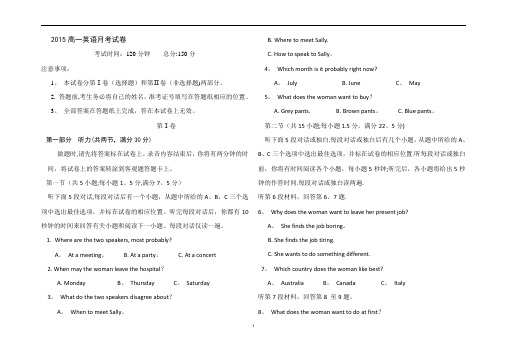
2015高一英语月考试卷考试时间:120分钟总分:150分注意事项:1。
本试卷分第Ⅰ卷(选择题)和第Ⅱ卷(非选择题)两部分。
2. 答题前,考生务必将自己的姓名,准考证号填写在答题纸相应的位置。
3。
全部答案在答题纸上完成,答在本试卷上无效。
第Ⅰ卷第一部分听力(共两节,满分30分)做题时,请先将答案标在试卷上。
录音内容结束后,你将有两分钟的时间,将试卷上的答案转涂到客观题答题卡上。
第一节(共5小题;每小题1。
5分,满分7。
5分)听下面5段对话,每段对话后有一个小题,从题中所给的A、B、C三个选项中选出最佳选项,并标在试卷的相应位置。
听完每段对话后,你都有10秒钟的时间来回答有关小题和阅读下一小题。
每段对话仅读一遍。
1.Where are the two speakers, most probably?A。
At a meeting。
B. At a party。
C. At a concert2. When may the woman leave the hospital?A. Monday B。
Thursday C。
Saturday3。
What do the two speakers disagree about?A。
When to meet Sally。
B. Where to meet Sally.C. How to speak to Sally。
4。
Which month is it probably right now?A。
July B. June C。
May5。
What does the woman want to buy?A. Grey pants.B. Brown pants。
C. Blue pants。
第二节(共15小题;每小题1.5分,满分22。
5分)听下面5段对话或独白.每段对话或独白后有几个小题,从题中所给的A、B、C三个选项中选出最佳选项,并标在试卷的相应位置.听每段对话或独白前,你将有时间阅读各个小题,每小题5秒钟;听完后,各小题将给出5秒钟的作答时间.每段对话或独白读两遍.听第6段材料,回答第6、7题.6。
托福TPO15听力Conversation1文本+题目+答案解析

为了帮助大家高效备考托福,为大家带来托福TPO15听力Conversation1文本+题目+答案解析,希望对大家备考有所帮助。
托福TPO15听力Conversation1文本 Narrator: Listen to a conversation between a student and the faculty adviser of the campus newspaper. Man: Hi, I talked to someone on the phone a couple of weeks ago. Anna, I think it was? Woman: I am Anna, the faculty adviser. Man: Oh, great! I’m Peter Murphy. You probably don’t remember me, but … Woman: No, no, I remember you. You were interested in working for the paper. Man: Yeah, as a reporter. Woman: That’s right. Uh, you’re taking a journalism class and you’ve done some reporting before in high school, right? Man: Wow, you have a good memory. Woman: Well, we haven’t had many students applying lately. So, anyway, you still want to do some reporting for us? Man: Yeah, if you have room for me on the staff. Woman: Well, we always need more reporters, but you know we don’t pay anything, right? Man: Yeah, I know. But I, uh, I’d like the experience. It will look good on my resume. Woman: Absolutely! Let’s see. I think I told you that we ask prospective reporters to turn in some outlines for possible articles? Ma: Yeah, I sent them in about a week ago. But I haven’t heard anything back yet, so, so I thought I’d stop by and see, but I guess you haven’t looked at them yet. Woman: Oh, Max, the news editor, he looks at all the submissions. Man: Oh, so he hasn’t made any decision about me yet? Woman: Well, I just got here a few minutes ago, haven’t been in for a couple of days. Uh, just give me a second to check my email. Uh, here’s a message from Max. Let’ see. Well, it seems you’ve really impressed him. He says it’d be wonderful if you could join our staff. Man: Oh, great! When can I start? Woman: Well, you turned in an outline on something to do with the Physics Department? Man: Yeah. They’re trying to come up with ways to get more students to take their introductory courses. Woman: Right. Well, apparently nobody else is covering that story so he wants you to follow up on it. Man: OK. Uh, what about the other outline I sent in? About the proposed increase in tuition fee? Woman: Oh, it looks like we’ve got that covered. Man: So, I’m starting with an article about the Physics Department. I guess I’d better get to work. Do you have any advice on how I should cover the story? Woman: Well, Max wanted to talk to you, but, I’m sure he’ll tell you to find out things like why the Physics Department worried about enrollment. Has the number of students been getting smaller in recent years? By how much? What kinds of plans they’re considering to address this problem? Man: Right. Some of those issues are already in what I proposed. Woman: And you want to do some interviews: you know, what the professors think of the plans, what the students think. You get the idea, but… Man: But wait till I talk to Max before proceeding? Woman: Right, he’ll cover everything you need to know to be a reporter for us. Can you come back this afternoon? He’ll be here until five o’clock. 托福TPO15听力Conversation1题目 1.Why does the student go to the campus newspaper office?。
topik60届中高级听力原文
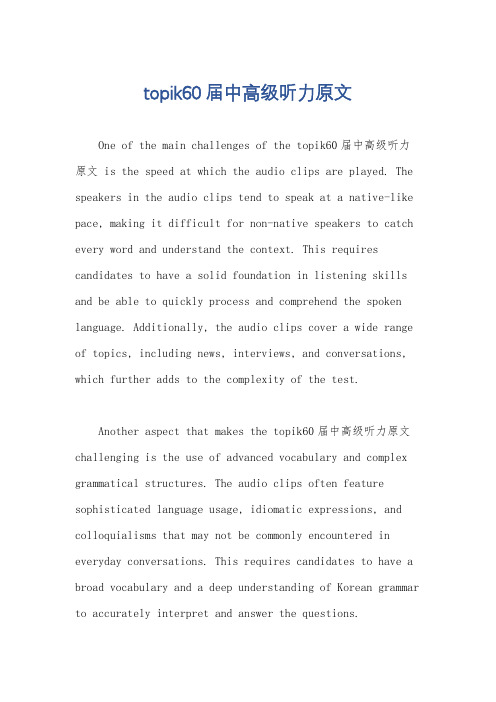
topik60届中高级听力原文One of the main challenges of the topik60届中高级听力原文 is the speed at which the audio clips are played. The speakers in the audio clips tend to speak at a native-like pace, making it difficult for non-native speakers to catch every word and understand the context. This requires candidates to have a solid foundation in listening skills and be able to quickly process and comprehend the spoken language. Additionally, the audio clips cover a wide range of topics, including news, interviews, and conversations, which further adds to the complexity of the test.Another aspect that makes the topik60届中高级听力原文challenging is the use of advanced vocabulary and complex grammatical structures. The audio clips often feature sophisticated language usage, idiomatic expressions, and colloquialisms that may not be commonly encountered in everyday conversations. This requires candidates to have a broad vocabulary and a deep understanding of Korean grammar to accurately interpret and answer the questions.Furthermore, the topik60届中高级听力原文 requires candidates to possess excellent concentration and focus. The audio clips are relatively long, ranging from a few minutes to over ten minutes, and candidates must maintain their attention throughout the duration of each clip. This can be mentally exhausting, especially for non-native speakers who may not be accustomed to extended periods of intense listening.In addition to the technical challenges, candidates may also face emotional hurdles when preparing for the topik60届中高级听力原文. The fear of failure and the pressure to perform well can create anxiety and stress. This can negatively impact a candidate's ability to concentrate and comprehend the audio clips effectively. It is important for candidates to manage their emotions and maintain a positive mindset during their preparation to overcome these challenges.In conclusion, the topik60届中高级听力原文 poses several challenges for candidates aiming to demonstratetheir advanced level of Korean language proficiency. These challenges include the fast pace of the audio clips, the use of advanced vocabulary and grammar, the need for excellent concentration, and the emotional pressure associated with the test. However, with thorough preparation, practice, and a positive mindset, candidates can overcome these challenges and perform well in the test.。
2015年高考真题英语听力真题及听力原文附答案(全国卷)
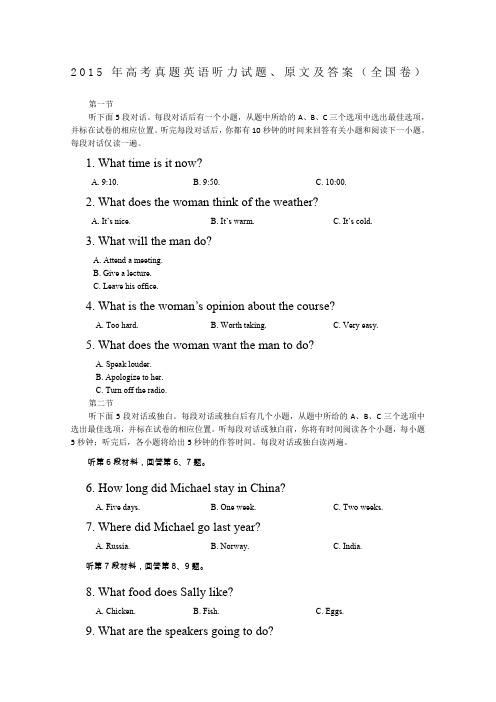
2015年高考真题英语听力试题、原文及答案(全国卷)第一节听下面5段对话。
每段对话后有一个小题,从题中所给的A、B、C三个选项中选出最佳选项,并标在试卷的相应位置。
听完每段对话后,你都有10秒钟的时间来回答有关小题和阅读下一小题。
每段对话仅读一遍。
1. What time is it now?A. 9:10.B. 9:50.C. 10:00.2. What does the woman think of the weather?A. It’s nice.B. It’s warm.C. It’s cold.3. What will the man do?A. Attend a meeting.B. Give a lecture.C. Leave his office.4. What is the woman’s opinion about the course?A. Too hard.B. Worth taking.C. Very easy.5. What does the woman want the man to do?A. Speak louder.B. Apologize to her.C. Turn off the radio.第二节听下面5段对话或独白。
每段对话或独白后有几个小题,从题中所给的A、B、C三个选项中选出最佳选项,并标在试卷的相应位置。
听每段对话或独白前,你将有时间阅读各个小题,每小题5秒钟;听完后,各小题将给出5秒钟的作答时间。
每段对话或独白读两遍。
听第6段材料,回答第6、7题。
6. How long did Michael stay in China?A. Five days.B. One week.C. Two weeks.7. Where did Michael go last year?A. Russia.B. Norway.C. India.听第7段材料,回答第8、9题。
TPO15 听力答案解析

By 宋思祺TPO15 Section 1Conversation 1CDDAA1.男生为什么去学校的报纸办公室?老师说,(9,21)I remember you . You're interestedin working for the paper.我记得你,你是对为报纸工作很感兴趣,学生说是的,作为记者。
Yeah, as a reporter。
老师后面又说,(50)Advisor Absolutely! Let's see . I think I told you that we ask prospective reporters to turn in some outlines for possible articles . 我告诉过你做记者要交几篇提纲Student Yeah, I sent them in about a week ago, but I haven't heard anything back yet, so, so I thought I'd stop by and see, but I guess you haven't looked at them yet .我发了,但是并没有收到回音,所以过来看看。
这里就可以得出结论,学生来是为了看看他有没有获得记者的职位。
所以选C2.问学生为什么想给学校报纸写文章。
(47秒)I'd like the experience. It would lookgood on my resume .我想要这种经历,这会使我的简历看上去更好,这就可以选D,他认为经验非常重要。
3.学生提到了计划增加学费的话题,advisor对这个话题的看法?(1,50)Student OK.Uh … wha t the other outline I sent i n, about the proposed increase in tuition fees?那另外一篇提纲呢?关于计划增加学费的。
托福听力TPO15对话1原文英文及翻译
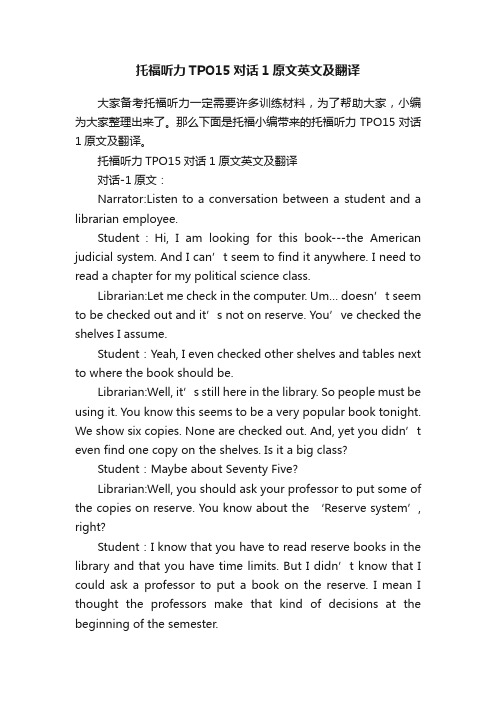
托福听力TPO15对话1原文英文及翻译大家备考托福听力一定需要许多训练材料,为了帮助大家,小编为大家整理出来了。
那么下面是托福小编带来的托福听力TPO15对话1原文及翻译。
托福听力TPO15对话1原文英文及翻译对话-1原文:Narrator:Listen to a conversation between a student and a librarian employee.Student:Hi, I am looking for this book---the American judicial system. And I can’t seem to find it anywhere. I need to read a chapter for my political science class.Librarian:Let me check in the computer. Um… doesn’t seem to be checked out and i t’s not on reserve. You’ve checked the shelves I assume.Student:Yeah, I even checked other shelves and tables next to where the book should be.Librarian:Well, it’s still here in the library. So people must be using it. You know this seems to be a very popular book tonight. We show six copies. None are checked out. And, yet you didn’t even find one copy on the shelves. Is it a big class?Student:Maybe about Seventy Five?Librarian:Well, you should ask your professor to put some of the copies on reserve. Yo u know about the ‘Reserve system’, right?Student:I know that you have to read reserve books in the library and that you have time limits. But I didn’t know that I could ask a professor to put a book on the reserve. I mean I thought the professors make that kind of decisions at the beginning of the semester.Librarian:Oh… they can put books on reserve at any time during the semester.Student:You know reserving book seems a bit unfair. What if someone who is not in the class wants to use the book?Librarian:That’s why I said some copies.Student:Ah, well, I’ll certainly talk to my professor about it tomorrow. But what I am gonna do tonight?Librarian:I guess you could walk around the Poli-Sci section and look at the books waiting to be re-shelved.Student:There are do seem to be more than normal.Librarian:We are a little short of staff right now. Someone quit recently, so things aren’t getting re-shelved as quickly as usual. I don’t think they’ve hired replacement yet, so, yeah, the un-shelved books can get a bit out of hand.Student:This may sound a bit weird. But I’ve been thinking about getting a job. Um… I’ve never worked at the library before, But…..Librarian:That’s not a requirement. The job might still be open. At the beginning of the semester we were swamped with applications, but I guess everyone who wants the job has one by now.Student:What can you tell me about the job?Librarian:Well, we work between six and ten hours a week, so it’s a reasonable amount. Usually we can pick the hours we want to work. But since you’d be starting so late in the semester, I’m not sure how that would work for you. And… Oh… we get paid the normal university rates for student employees.Student:So who do I talk to?Librarian:I guess you talk to Dr. Jenkins, the head librarian. She does the hiring.对话-1译文:旁白:听一个学生和一个图书馆员工之间的对话。
2015年全国高考日语试卷及答案

绝密*启用前解密时间:2015年&月S B 17:00 [考试时间俺月8日圧】叫一17:00】2015年普通高等学校招生全国统一考试日语试题卷H涪试題卷共W页。
満分150分©碧试时何120分钟,注意事砸:L答题前,务必将自己的姓名、准考证号填写在答题卡规定的位置上。
2. 崙选择题时’必皱使用用第笔将答题咅匕对应魁冃的髡案标号涂黠.如需改动,用據皮擦擦F;?后,再选涂其它答案标号.3. 答非选择题时’必须便用0」毫米黑他螯字笔,将答窠书写在答题卡規定的隹酋,上。
丄所有题目必须在答题卡上作塞在试题程上答题无瓠5.考试结束后,将试题卷和答題卡一井交冋。
第一部分听力(共两节”満分対分)做題时’先将答案标在试卷上"录咅内容结東后,你褂右两分坤的时側将试卷上的答案转填到答題卡上.第一节供了小廳每小J82分,满分14分)听F面丁段录音,每段录音后有1道小題・从d 緘心个选项中透出最桂选项。
每段墩音只皤放一遍.例:男町人語总勉強J主A, &力明/B. g加耳 C. 12力•月1・男◎人I士今兰3二来G 憔1~九A. B.友吃如家 C.先生◎研兜室2*二◎本ft扫石力9上廿力屯氐樹穴沁gj /<分C, 上刁芒丁的J:〈覚3. 女◎人怎昨目何总J J尢力铅A. 家B.B. 家"C雑誌总謊人疋過求L^°4. 男巧人iiifr-nr?A. B.卄口处C.5. 男◎人纵贯会I二行吉求寸力、,A. 行吉去歹©B.B. 分力6. 図書館m. 力、A*食心^总食v召二J:B. ・工一X总飲ff二上C, 携带電話总使刁::七7. 結ftff式①拎祝IN士屮力铭A. 1万円<^b、B* 3万円C. 1万円力吃3万円UBS第二节(共8小题:每小题2分.満分応分)听下而4段录音,每段录音后有2逍小题,从A. B, C三个选项中选出最佳选项.每段录音播放两遍。
8. 女◎人月:何总忘ill:Xa.A.期◎人也約束B.電話U出召二上C.男◎人RLlg話t^Lh9・女①人疲tlH求寸•力备A. 携帯总家忙卓把力电B. 試験。
CATTI韩语二级口译真题

CATTI韩语二级口译真题在2020年,全国翻译资格考试CATTI首次加入了朝/韩语科目,以后我们也是可以参加全国统一组织的专业资格类考试的人啦!所以,下面就给大家带来CATTI韩语二级口译真题介绍,希望对你们有所帮助。
CATTI韩语二级口译真题回顾CATTI二级朝/韩语口译的考试时间是11月14日,口译综合能力13:30-14:30,口译实务15:00-16:00,综合能力和实务间隔半小时。
虽然准考证上写得是中途不能离开考场,但实际情况是综合能力考完后,间隔的半小时里老师是允许考生去卫生间的。
考前对于口译机考这种形式不必有太多的担心,考试带好身份证、准考证、一只黑色签字笔即可,考场会有充足的草稿纸。
第一门综合能力试题的题型分为判断题(10x2分,正确选择A,错误选择B)、短句选项(10x2分)、篇章选项(20x2分)。
都是客观题,考验考生听力能力,听完录音后进行选择,录音只有一遍。
判断题和短句选项比较简单,类似TOPIK前面部分的听力难易程度,个人感觉甚至比TOPIK前部分听力更简短、更简单一点。
所以对于这部分,我有一点点小建议,就是当你在判断题和短句选项题应付自如的情况下,提前快速浏览篇章选项的题干题支,充分合理利用时间。
第二门口译实务(交替传译)朝/韩语→中文两篇①关于中韩两国关系(期许两国进一步扩大深化各领域合作)的讲话②关于城市可持续开发中文→朝/韩语两篇①东北亚各国加强合作、构建命运共同体的演讲②习近平关于疫情防控的视频讲话关于实务,下面几点需要注意:一是考试中考生之间都是挨着坐的,距离很近,翻译的时候能明显听到左右两边考生的声音,所以要专注自身,具备一定的抗干扰能力。
三是录音过程中减少嗯、呃、哎等语气词。
录音设备还是很灵敏的,自身发出的声音都会被收录进去。
记得组织一下语言后再流畅地录音作答。
四是打好自身基础是王道。
平时多关注时事,多积累词汇,做一些口译练习,多说多磨嘴皮。
韩语基础语法概要名词+을/를;宾语助词名词最后面有收音时,用“을”,没有收音时,用“를”。
